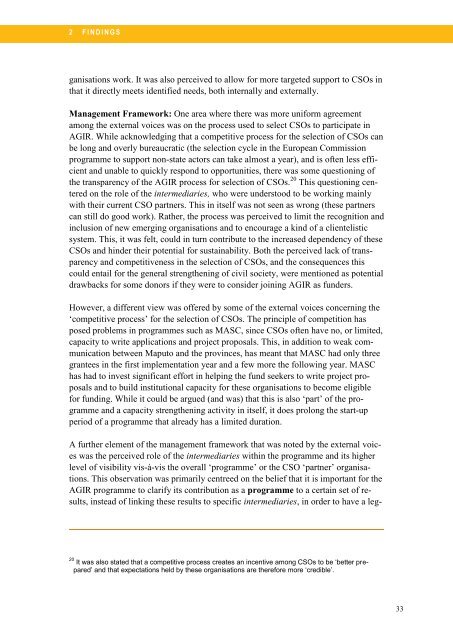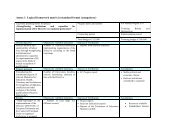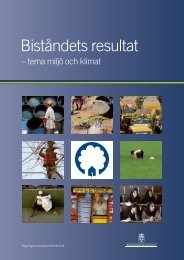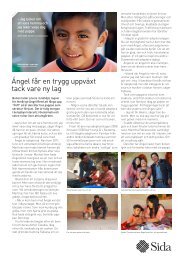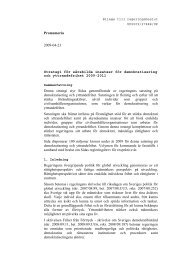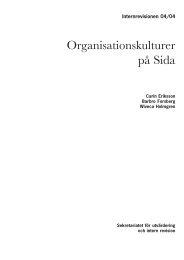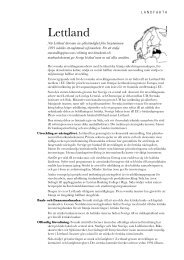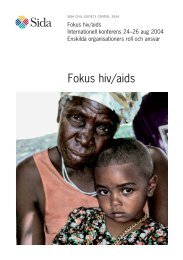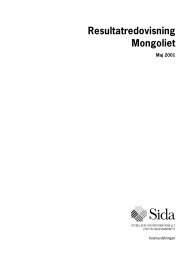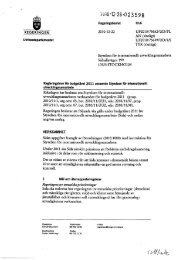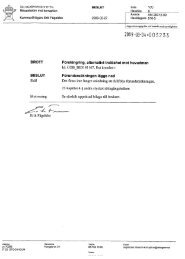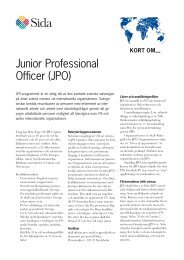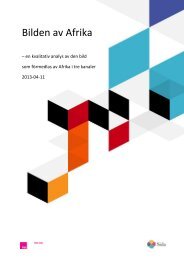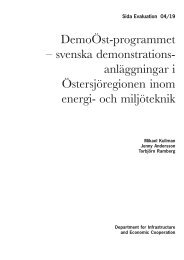Mid-Term Review of the AGIR Programme - Sida
Mid-Term Review of the AGIR Programme - Sida
Mid-Term Review of the AGIR Programme - Sida
You also want an ePaper? Increase the reach of your titles
YUMPU automatically turns print PDFs into web optimized ePapers that Google loves.
2 F I N D I N G S<br />
ganisations work. It was also perceived to allow for more targeted support to CSOs in<br />
that it directly meets identified needs, both internally and externally.<br />
Management Framework: One area where <strong>the</strong>re was more uniform agreement<br />
among <strong>the</strong> external voices was on <strong>the</strong> process used to select CSOs to participate in<br />
<strong>AGIR</strong>. While acknowledging that a competitive process for <strong>the</strong> selection <strong>of</strong> CSOs can<br />
be long and overly bureaucratic (<strong>the</strong> selection cycle in <strong>the</strong> European Commission<br />
programme to support non-state actors can take almost a year), and is <strong>of</strong>ten less efficient<br />
and unable to quickly respond to opportunities, <strong>the</strong>re was some questioning <strong>of</strong><br />
<strong>the</strong> transparency <strong>of</strong> <strong>the</strong> <strong>AGIR</strong> process for selection <strong>of</strong> CSOs. 20 This questioning centered<br />
on <strong>the</strong> role <strong>of</strong> <strong>the</strong> intermediaries, who were understood to be working mainly<br />
with <strong>the</strong>ir current CSO partners. This in itself was not seen as wrong (<strong>the</strong>se partners<br />
can still do good work). Ra<strong>the</strong>r, <strong>the</strong> process was perceived to limit <strong>the</strong> recognition and<br />
inclusion <strong>of</strong> new emerging organisations and to encourage a kind <strong>of</strong> a clientelistic<br />
system. This, it was felt, could in turn contribute to <strong>the</strong> increased dependency <strong>of</strong> <strong>the</strong>se<br />
CSOs and hinder <strong>the</strong>ir potential for sustainability. Both <strong>the</strong> perceived lack <strong>of</strong> transparency<br />
and competitiveness in <strong>the</strong> selection <strong>of</strong> CSOs, and <strong>the</strong> consequences this<br />
could entail for <strong>the</strong> general streng<strong>the</strong>ning <strong>of</strong> civil society, were mentioned as potential<br />
drawbacks for some donors if <strong>the</strong>y were to consider joining <strong>AGIR</strong> as funders.<br />
However, a different view was <strong>of</strong>fered by some <strong>of</strong> <strong>the</strong> external voices concerning <strong>the</strong><br />
‘competitive process’ for <strong>the</strong> selection <strong>of</strong> CSOs. The principle <strong>of</strong> competition has<br />
posed problems in programmes such as MASC, since CSOs <strong>of</strong>ten have no, or limited,<br />
capacity to write applications and project proposals. This, in addition to weak communication<br />
between Maputo and <strong>the</strong> provinces, has meant that MASC had only three<br />
grantees in <strong>the</strong> first implementation year and a few more <strong>the</strong> following year. MASC<br />
has had to invest significant effort in helping <strong>the</strong> fund seekers to write project proposals<br />
and to build institutional capacity for <strong>the</strong>se organisations to become eligible<br />
for funding. While it could be argued (and was) that this is also ‘part’ <strong>of</strong> <strong>the</strong> programme<br />
and a capacity streng<strong>the</strong>ning activity in itself, it does prolong <strong>the</strong> start-up<br />
period <strong>of</strong> a programme that already has a limited duration.<br />
A fur<strong>the</strong>r element <strong>of</strong> <strong>the</strong> management framework that was noted by <strong>the</strong> external voices<br />
was <strong>the</strong> perceived role <strong>of</strong> <strong>the</strong> intermediaries within <strong>the</strong> programme and its higher<br />
level <strong>of</strong> visibility vis-á-vis <strong>the</strong> overall ‘programme’ or <strong>the</strong> CSO ‘partner’ organisations.<br />
This observation was primarily centreed on <strong>the</strong> belief that it is important for <strong>the</strong><br />
<strong>AGIR</strong> programme to clarify its contribution as a programme to a certain set <strong>of</strong> results,<br />
instead <strong>of</strong> linking <strong>the</strong>se results to specific intermediaries, in order to have a leg-<br />
20 It was also stated that a competitive process creates an incentive among CSOs to be ‘better prepared’<br />
and that expectations held by <strong>the</strong>se organisations are <strong>the</strong>refore more ‘credible’.<br />
33


